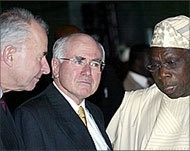Zimbabwe to remain outside C’wealth
The Commonwealth has extended sanctions against Zimbabwe for violating the group’s democratic values after a dispute that reawakened old colonial resentments in parts of Africa.

The summit also appointed a seven-nation panel to monitor political dialogue and human rights in Zimbabwe.
“The key issues are political dialogue between Zanu-PF and the opposition and human rights,” a Zambian official told journalists, referring to President Robert Mugabe’s political party.
The 54-strong world body of mainly former British colonies suspended Zimbabwe early last year on the grounds Mugabe had rigged his re-election and persecuted his opponents.
After last-minute brinkmanship between Britain and South Africa, which strongly resisted pressure to keep Mugabe out of the club, a six-nation panel charged with resolving the issue recommended Harare’s continued exclusion on Sunday.
Mugabe reaction
A defiant Mugabe had already threatened to withdraw from the group, accusing it of being hijacked by “racist” Westerners, especially Zimbabwe’s former colonial ruler Britain.
The 79-year-old leader, in power since independence in 1980, had sympathy from a small but powerful group of southern African nations which are lobbying for his country’s re-admission at the biennial summit in the Nigerian capital Abuja.
The row has produced the most tension at the Commonwealth meeting since apartheid in South Africa in the early 1990s.
It has dominated the four-day biennial summit, to the frustration of many delegates eager to discuss topics such as fair trade, AIDS and terrorism.
Delay
 |
|
President Obasanjo’s views differ |
Leaders tried to contain the Zimbabwe feud early in the conference by appointing the six-man task force, split roughly between Mugabe friends and foes.
But the move prolonged the dispute, and Mugabe’s threats from Harare to withdraw raised the stakes further.
Mugabe accused Britain and other “Anglo-Saxon” countries of punishing him for land reforms that have given white-owned farms to landless blacks.
His argument finds resonance with many other African leaders whose political lives started in the fight against British imperialism.
Many Africans suspect British demands for democratic reforms in Zimbabwe are just a cover for protecting white farmers and their land.
Blair defence
Blair said it was wrong to “muddle” that issue with questions of Zimbabwean democracy and rights violations.
“The vast majority of countries – black or white or Asian – are in favour of continuing the suspension because we can see that Zimbabwe is so clearly in breach of all the principles the Commonwealth stands for,” he said in a television interview.
But thousands of miles away in Zimbabwe, Mugabe disparaged the Commonwealth as “a mere club” and likened it to George Orwell’s classic political satire “‘Animal Farm’, where some members are more equal than others”.